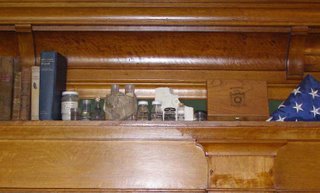No, it is not a very original title but the subject has been on my mind. Many would agree with these two categories but they would probably draw the line at a different place than I. I draw it between personal darkness and personal light. There is a sizeable majority of active, sincere (meaning not nominal) Christians who do not seem to be changed by the Holy Spirit. Worse, there are ministries which, seeing where the demographics of "size success" abide, cater their doctrines and their words to attract and keep that majority. That majority becomes the history of the Church. That population sends its generations to seminary. There is more of practical unregenerating belief in the Church than regenerating belief.
Of course, that majority does not know the Lord Jesus Christ and has not been set free from sin. These ministries that speak to them can be liberal and say there is no sin (except racism or believing in sin) but they are generally not successful because they give insufficient religious perks and are hard to distinguish from the secular. The successful church or ministry will be conservative. They try, with the law and church culture, to tidy up these church-going, creed-believers so that a vague similarity to the ethics of Jesus might appear, at least in their brochures. It is whitewash for the "visible church". As an example see any Christian college's PR glossy and then visit the lives of the smiling students, let alone the homes of the teachers. I consider this Christendom infidel, not because it doesn't have faith but because it believes in its belief, like the Seven Sons of the High Priest Sceva in "Jesus whom Paul preaches." My years of observation has convinced me, with no residual doubt, of Our Lord's words, "Narrow is the way that leads to life and those that find it are few."
Christendom plays at being Christian unsuccessfully but quite successfully relives the foibles of Israel. Israel was an unregenerate nation which the Living God had chosen and had controlled through the Law. They trusted these deceptive words "This is the temple of the Lord, the temple of the Lord". That is exactly what the Christian culture mongers are seeking (be they the "keep my kids innocent" neo-agrarians or moralizing, political "prayer in public schools" activists or the Oxbridge medieval protestants engaged in heavy petting with Apostacy). Like Israel, they trust in their history, their liturgy, their buildings, their priesthood, their superstitious sacramental magic, and their social affectations. Yes, it is a "sign and a wonder", an empire which very busy men have built. It must be large, complete, and compelling. It has to make people think of themselves as Christians without personally "calling on the name of the Lord. It has to replace the Gift of God.
The Old Covenant was a needful means of running an unregenerate people with a modicum of external order. The New Covenant is making a different sort of person, ordered internally by the Holy Spirit. If you get handed a "Christian" culture by the leaders of your particular movement, you are joining the Old as Israel not the New in Christ, a shadow not a substance, a playtime of childish ways not maturity, law not grace, Christendom not the Kingdom of Our Lord and Christ. The Old Covenant was just that shallow. But the unredeemed want the shallow because they can touch it. They like their covenant reality to be a large and bumpy objectivity. The blind need it thus that they might feel their way along. They can believe that the church believes the right things because being blind, they have to trust someone else to post braille signposts along the way. They want the church to stand between them and God much like Moses stood between God and the people. But the writer of Hebrews says, "For you have not come to what may be touched." True Christianity is lived out by those for whom the Holy Spirit has written His culture on their hearts. Christianity is the subjectivity of a covenant and the covenant is the promise of a wonderous miracle of subjective change.
There can be splendor in a man made culture. It fills our aesthetic needs and desire for order but it is no guide to successful Christian living. If righteousness were through the law or any outside social manipulation we would have no need for grace. Some things must be your own, personally, as in the phrase "every one who calls on the name of the Lord will be saved." Are you one of these? Or do you have more than one "degree of separation" between you and God? There is a difference in metaphysical condition between the man or woman who believes that others believe correctly and those men and women who have believed. The first group wishes to have and needs to have the church they believe, believe correctly and to tell them what is good and how to live. The second have looked into the face of God, unveiled, and were changed. Are you someone who has found the narrow door or are you marching lockstep down a very broad highway to Destruction, with the comforting presence of the rest of Christendom.
The oracle: Christianity and the New Covenant is individual with the church as its collateral effect. It is not the Church with its collateral dictates to the individual.
On the temptation of Christendom, or any part of it, to dictate a culture, C.S. Lewis in Lilies That Fester:
"Anything transcendental or spiritual, or even anything very strongly ethical, in its pretensions is dangerous and encourages it to meddle with our private lives."
"The higher the pretensions of our rulers are, the more meddlesome and impertinent their rule is likely to be and the more the thing in whose name they rule will be defiled. The highest things have the most precarious foothold in our nature. By making sanctity or culture a moyen de parvenir you help to drive them out of the world."
And if you were always suspicious of Lewis, here is St. Paul.
II Corinthians 3
5 Not that we are competent of ourselves to claim anything as coming from us; our competence is from God, 6 who has made us competent to be ministers of a new covenant, not in a written code but in the Spirit; for the written code kills, but the Spirit gives life. 7 Now if the dispensation of death, carved in letters on stone, came with such splendor that the Israelites could not look at Moses' face because of its brightness, fading as this was, 8 will not the dispensation of the Spirit be attended with greater splendor? 9 For if there was splendor in the dispensation of condemnation, the dispensation of righteousness must far exceed it in splendor. 10 Indeed, in this case, what once had splendor has come to have no splendor at all, because of the splendor that surpasses it. 11 For if what faded away came with splendor, what is permanent must have much more splendor. 12 Since we have such a hope, we are very bold, 13 not like Moses, who put a veil over his face so that the Israelites might not see the end of the fading splendor. 14 But their minds were hardened; for to this day, when they read the old covenant, that same veil remains unlifted, because only through Christ is it taken away. 15 Yes, to this day whenever Moses is read a veil lies over their minds; 16 but when a man turns to the Lord the veil is removed. 17 Now the Lord is the Spirit, and where the Spirit of the Lord is, there is freedom. 18 And we all, with unveiled face, beholding the glory of the Lord, are being changed into his likeness from one degree of glory to another; for this comes from the Lord who is the Spirit.
 I found this old drawing I had done over twenty years ago and scanned it and colorized it.
I found this old drawing I had done over twenty years ago and scanned it and colorized it.  You have read of the calamity that fell on the saints of Big Haus!
You have read of the calamity that fell on the saints of Big Haus! Aeons pass. Stuff happens.
Aeons pass. Stuff happens. Desk drawers are a sanctuary. Things which had meaning and lost it need a place to hide until they can regain their meaning. What are they hiding from? Some woman, probably a wife or mother, scouring a house looking for things to sell in a yard sale. Yard sales are the liturgy and sacrament offered up to the Great Ancient Anatolian Goddess "Shopping" who has said repeatedly through her foul, eunuch priesthood that someday, somewhere everything you can possibly buy, you can buy for 25 cents. Think of these women as the Saturday Morning Maenads. But I digress. Desk drawers are partially designed to be outside a woman's sight. They blend. When shut, they look tidy and neat. All the while, inside their shallow deep and dark recesses, a gathering of the important stuff that will be the joy of many grandchildren after your death. This is because stuff cannot speak for itself. Men know that stuff in drawers has lost, if only temporarily, its meaning and cannot lay about in the open. The religious fervor of Woman would ignore your entreaties, look upon its pointlessness, and consign it to a bin, a bag, or box labeled "yard sale". There is no appeal. If she finds something wandering about after it has been consigned, she may choose to serve the commands of this G.A.A.G.S. rather then St. Paul's teaching regarding the withholding of connubial bliss (he was against it). Rather than risk this destructive force in a marriage, a man should set up these "drawers of refuge" in strategic spots around his domicile.
Desk drawers are a sanctuary. Things which had meaning and lost it need a place to hide until they can regain their meaning. What are they hiding from? Some woman, probably a wife or mother, scouring a house looking for things to sell in a yard sale. Yard sales are the liturgy and sacrament offered up to the Great Ancient Anatolian Goddess "Shopping" who has said repeatedly through her foul, eunuch priesthood that someday, somewhere everything you can possibly buy, you can buy for 25 cents. Think of these women as the Saturday Morning Maenads. But I digress. Desk drawers are partially designed to be outside a woman's sight. They blend. When shut, they look tidy and neat. All the while, inside their shallow deep and dark recesses, a gathering of the important stuff that will be the joy of many grandchildren after your death. This is because stuff cannot speak for itself. Men know that stuff in drawers has lost, if only temporarily, its meaning and cannot lay about in the open. The religious fervor of Woman would ignore your entreaties, look upon its pointlessness, and consign it to a bin, a bag, or box labeled "yard sale". There is no appeal. If she finds something wandering about after it has been consigned, she may choose to serve the commands of this G.A.A.G.S. rather then St. Paul's teaching regarding the withholding of connubial bliss (he was against it). Rather than risk this destructive force in a marriage, a man should set up these "drawers of refuge" in strategic spots around his domicile.